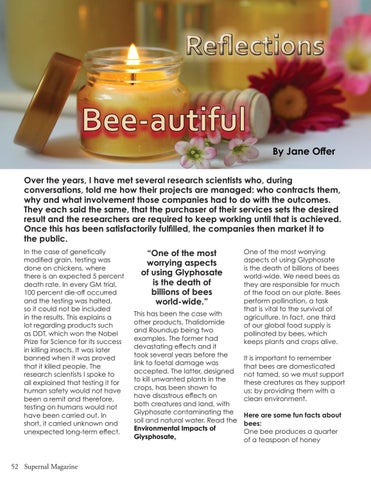Reflections
Bee-autiful By Jane Offer Over the years, I have met several research scientists who, during conversations, told me how their projects are managed: who contracts them, why and what involvement those companies had to do with the outcomes. They each said the same, that the purchaser of their services sets the desired result and the researchers are required to keep working until that is achieved. Once this has been satisfactorily fulfilled, the companies then market it to the public. In the case of genetically modified grain, testing was done on chickens, where there is an expected 5 percent death rate. In every GM trial, 100 percent die-off occurred and the testing was halted, so it could not be included in the results. This explains a lot regarding products such as DDT, which won the Nobel Prize for Science for its success in killing insects. It was later banned when it was proved that it killed people. The research scientists I spoke to all explained that testing it for human safety would not have been a remit and therefore, testing on humans would not have been carried out. In short, it carried unknown and unexpected long-term effect.
52 Supernal SupernalMagazine Magazine
“One of the most worrying aspects of using Glyphosate is the death of billions of bees world-wide.” This has been the case with other products, Thalidomide and Roundup being two examples. The former had devastating effects and it took several years before the link to foetal damage was accepted. The latter, designed to kill unwanted plants in the crops, has been shown to have disastrous effects on both creatures and land, with Glyphosate contaminating the soil and natural water. Read the Environmental Impacts of Glysphosate.
One of the most worrying aspects of using Glyphosate is the death of billions of bees world-wide. We need bees as they are responsible for much of the food on our plate. Bees perform pollination, a task that is vital to the survival of agriculture. In fact, one third of our global food supply is pollinated by bees, which keeps plants and crops alive. It is important to remember that bees are domesticated not tamed, so we must support these creatures as they support us; by providing them with a clean environment. Here are some fun facts about bees: One bee produces a quarter of a teaspoon of honey





















